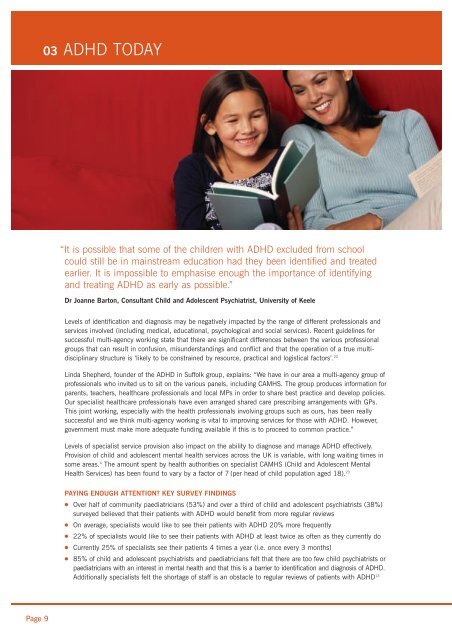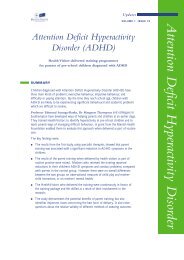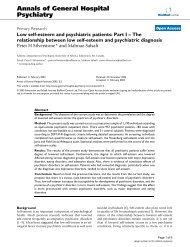are we paying enough attention? - Addiss
are we paying enough attention? - Addiss
are we paying enough attention? - Addiss
- No tags were found...
You also want an ePaper? Increase the reach of your titles
YUMPU automatically turns print PDFs into web optimized ePapers that Google loves.
03 ADHD TODAY“It is possible that some of the children with ADHD excluded from schoolcould still be in mainstream education had they been identified and treatedearlier. It is impossible to emphasise <strong>enough</strong> the importance of identifyingand treating ADHD as early as possible.”Dr Joanne Barton, Consultant Child and Adolescent Psychiatrist, University of KeeleLevels of identification and diagnosis may be negatively impacted by the range of different professionals andservices involved (including medical, educational, psychological and social services). Recent guidelines forsuccessful multi-agency working state that there <strong>are</strong> significant differences bet<strong>we</strong>en the various professionalgroups that can result in confusion, misunderstandings and conflict and that the operation of a true multidisciplinarystructure is ‘likely to be constrained by resource, practical and logistical factors’. 22Linda Shepherd, founder of the ADHD in Suffolk group, explains: “We have in our <strong>are</strong>a a multi-agency group ofprofessionals who invited us to sit on the various panels, including CAMHS. The group produces information forp<strong>are</strong>nts, teachers, healthc<strong>are</strong> professionals and local MPs in order to sh<strong>are</strong> best practice and develop policies.Our specialist healthc<strong>are</strong> professionals have even arranged sh<strong>are</strong>d c<strong>are</strong> prescribing arrangements with GPs.This joint working, especially with the health professionals involving groups such as ours, has been reallysuccessful and <strong>we</strong> think multi-agency working is vital to improving services for those with ADHD. Ho<strong>we</strong>ver,government must make more adequate funding available if this is to proceed to common practice.”Levels of specialist service provision also impact on the ability to diagnose and manage ADHD effectively.Provision of child and adolescent mental health services across the UK is variable, with long waiting times insome <strong>are</strong>as. 4 The amount spent by health authorities on specialist CAMHS (Child and Adolescent MentalHealth Services) has been found to vary by a factor of 7 (per head of child population aged 18). 23PAYING ENOUGH ATTENTION? KEY SURVEY FINDINGS● Over half of community paediatricians (53%) and over a third of child and adolescent psychiatrists (38%)surveyed believed that their patients with ADHD would benefit from more regular reviews● On average, specialists would like to see their patients with ADHD 20% more frequently● 22% of specialists would like to see their patients with ADHD at least twice as often as they currently do● Currently 25% of specialists see their patients 4 times a year (i.e. once every 3 months)● 85% of child and adolescent psychiatrists and paediatricians felt that there <strong>are</strong> too few child psychiatrists orpaediatricians with an interest in mental health and that this is a barrier to identification and diagnosis of ADHD.Additionally specialists felt the shortage of staff is an obstacle to regular reviews of patients with ADHD 13Page 9




